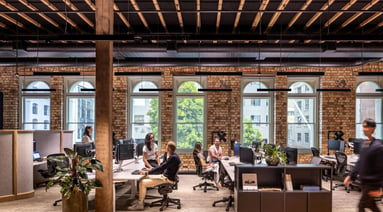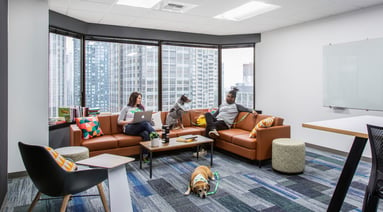The value exchange: Purposeful presence as a gift to co-workers and organizational culture

We sat down with Lena Mueller, Principal, Strategy at Unispace, who reflected on 2022 and expressed gratitude for her team and our clients who have provided invaluable insights into their workplace challenges.
A McKinsey study highlights that leaders are increasingly worried about the impact of the past 20-plus months on company culture, connectivity, and cohesion and a Deloitte survey found that 94% of executives and 88% of employees believe a distinct workplace culture is important to business success. The “return to work” challenge has been the focus of many conversations and questions this year and they were all very similar with people at the center. Businesses are trying to balance the need of their staff while maximizing business performance and preparing for tough economic times while many are still “figuring out” their hybrid approach which touches so many interconnected aspects and requires alignment across the entire business. But that is a topic for another day.
Interestingly though, another McKinsey article highlights the 6 priorities for CEOs in turbulent times. One of the priorities is to "rebuild the employee experience" - when having a closer look, this in particular relates to the workplace, a place where people belong, connect, exchange ideas, learn together, have fun, and mostly, truly want to be.
We are seeing that many employees still prefer to work from home the majority of the time. And business leaders struggle with the fact that there is a lack of cross-pollination and innovation and the ability to pivot quickly and execute ideas while many organisational cultures have been negatively impacted over the last 2+ years. Many businesses are still trying to figure out how to effectively collaborate asynchronously, meaning people collaborating while not being physically together.
Given that majority of business are providing flexibility, most people base their decision whether to work from home or not, on individual needs. And those needs vary, considering demographics, caring responsibilities, home set-up, and personalities just to name a few.
Businesses perform better because of individuals. Individuals influence the collective wellbeing for better relationships which in turn positively impact business performance. There is real value in the power of social connection. Engaged employees have an even greater impact!
Has the time come that we consider the collective needs more than our own and reconsider that in-person collaboration improves relationships which may have a direct impact on individuals and the business?
And here is my analogy to the end-of-year reflection:
Every individual has an innate and fundamental need to exchange value. We come together to exchange ideas, past experiences, skills, opinions and even our energy.
A team is greater than the sum of its individual parts: So, collectively, let's focus less on our own preferences and needs but rather look at the value of our work communities to increase everyone’s engagement. Come to work with the intention to leave your work community better off because of your presence and intentions, compared to not being there at all.
A key driver of a strong community is the exchange of knowledge and resources for the betterment of all members. This process of sharing an organisation not only strengthens the broader community around them, but simultaneously improves the internal community via acknowledgement of skills, a greater sense of purpose, and connectedness.
61% of respondents note the challenge of a lack of visibility into what colleagues are working on when working remotely (Unispace global data). That’s missing out on a hell of a lot where an individual could provide input but hasn’t been given the opportunity. Imagine the unknown possibilities, the sparks that are not happening, purely because people do not know what others are working on and where they would be able to contribute in a meaningful way.
Our global data also shows that 87% of employees say that going to work contributes to a sense of community and 78% say that working in the office is important to maintain an organisation’s culture. The majority of people miss the exchange of ideas when working remotely and the lack of social connection.
People at work are motivated by social relationships and the need to belong as the most critical ingredient of long-term wellbeing.
Every employee has a responsibility to positively impact organizational culture and the wellbeing of all colleagues. Individuals may need to shift their thinking on flexibility unless it is not detrimental to the needs of the team – the presence of every individual plays a significant role within the context of a team and the organisation at large. Social connections as a glue for culture have gained in significance post pandemic.
Let’s also not forget our future leaders. With less in-person collaboration, lack of observation and learning by osmosis, we are also impacting the resilience of a community and the organisation. Over 70% of effective learning happens in person.
It is about more than business continuity and succession planning: It's about building generational resilience, and we all have a responsibility to support our younger coworkers.
Can the workplace be the catalyst for culture, community, and engagement, therefore positively impacting organizational performance as a tool for companies to facilitate opportunities for social connection and to even maximize the social capital?
“A workplace is the only place that can culturally unite a group of minds with a common purpose.”
So maybe your gift to your colleagues is your purposeful presence?
Check out the original article.
About Lena Mueller
 Lena is a global citizen - an international manager with over 13 years experience in managing large and complex business transformation projects across the globe and in various industries. She has worked on four continents leading multi-national teams since 2011. She has worked in the commercial interior design, legal, automotive, aviation, payment, and financial services industries. Today, Lena brings learnings from these experiences and her passion for people-centric innovation and change to her role in leading workplace strategy projects at Unispace.
Lena is a global citizen - an international manager with over 13 years experience in managing large and complex business transformation projects across the globe and in various industries. She has worked on four continents leading multi-national teams since 2011. She has worked in the commercial interior design, legal, automotive, aviation, payment, and financial services industries. Today, Lena brings learnings from these experiences and her passion for people-centric innovation and change to her role in leading workplace strategy projects at Unispace.


